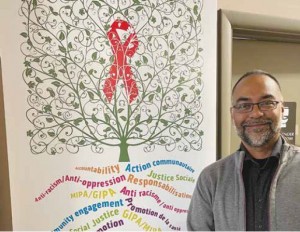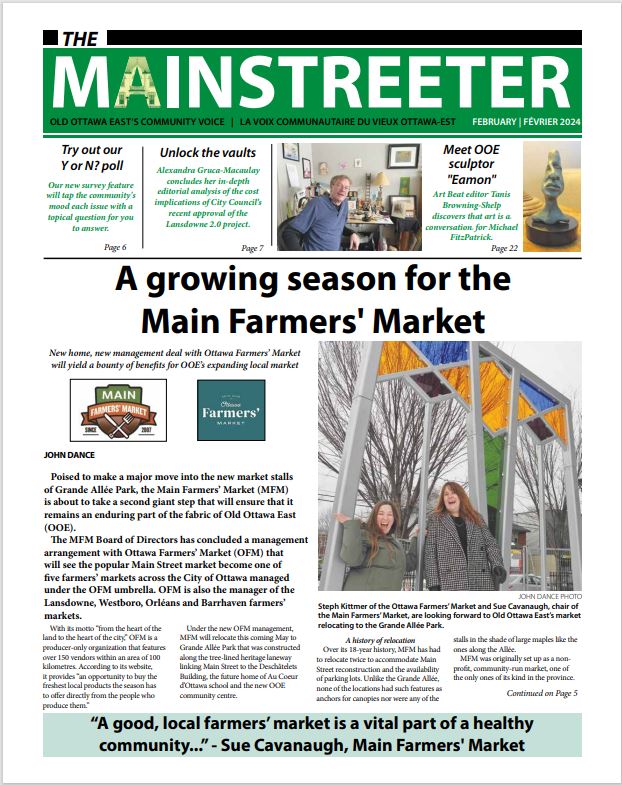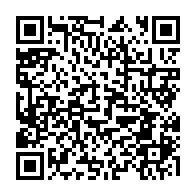Our popular interview feature – Sharing Lunch With… – returns in this issue to introduce the community to an organization located in Old Ottawa East that has been doing critically important work in support of its clients since 1985 – the AIDS Committee of Ottawa (ACO). Located since 2014 in a relatively obscure building situated at the juncture of Main Street and Greenfield Avenue, ACO has been an excellent neighbour to those residents living nearby, many of whom have provided donations or served as volunteers since the organization moved into Old Ottawa East from its original downtown location.
In this instalment of Sharing Lunch With…, we spoke to Khaled Salam, the vibrant Executive Director of ACO for the past 10 years, and a force behind the successful operation of the organization and its seamless integration into our community. Salam, who has spent his entire working career with ACO in one role or another, explains the work the organization does and how it has helped its clients navigate their way safely through the COVID virus even as they continued to grapple with the more familiar AIDS virus.
THE MAINSTREETER: Khaled, how long has the ACO organization been located in its current offices on Main Street?
SALAM: We are at 19 Main Street, between Greenfield Avenue and Echo Drive by the Rideau Canal. We are very privileged to have this wonderful location in this community. We opened our doors here on Main Street on December 1, 2014. December 1 is World AIDS Day, in case anyone doesn’t know. So we have been here going on seven years. Initially, we signed a five year lease from 2014 to 2019, and we were very happy to renew our lease for another five years. So we are going to be here for sure until at least December, 1 2024.
THE MAINSTREETER: Where was ACO located before you moved to Main Street, and when you did move, at that time, were there any concerns expressed by the community or by neighbours?
SALAM: Prior to the move to Main Street, the ACO office was located at the corner of Bank Street and Cooper Street downtown in a 7-storey high rise building. We were in that building from 2003 to 2014, a total of 11 years before we moved to Old Ottawa East.
I was the executive director when we moved here. Overall, the move, and our transition to this community, was quite smooth. But at the same time, as an organization and as a client community, we knew that in moving to this new neighbourhood, we would need to have some kind of a communications plan in place to let people know ahead of time that they’re going to have a social service agency in their midst. This kind of news doesn’t please everyone. Naturally, we expected this to be the case when an organization like ours that provides various services and programs to people living with HIV and people at risk of HIV moves into your neighbourhood.
We started by reaching out to the community association through then-City Councillor David Chernushenko. We invited people for open viewings of our space, and we took part in the Doors Open Ottawa event every year so that neighbours and others could visit our space and learn about our work.
At the beginning, it was a little bit of a rough ride in the sense that there were definitely some very vocal community members who didn’t know much about us and had concerns around our services and programs – particularly our Harm Reduction Program, through which we provide safer injection supplies to folks who use drugs. The program is much more than just a needle drop-off and pick-up – it provides many different types of support that people with HIV need in various aspects of their life, but nevertheless, it’s a controversial program in the sense of how it’s perceived.
We live in a drug-phobic society where people have myths and misconceptions about drug use, about who uses drugs and how they use drugs. When we first moved to the neighbourhood, some community members had legitimate fears and concerns because they didn’t know much about harm reduction or our program in general. I think there were some folks concerned that they’d be finding needles and syringes everywhere on the sidewalk or step on them, and that crime would go up in the neighbourhood because of who uses our services and programs. I mean there’s a legitimacy to some of those concerns, especially if people don’t know or have the information. I think it was great that we were able to connect and share our point of view in response to the questions and share the information that we have.

OOE neighbours and friends donate hundreds of egg cartons for use in the weekly food bank program run by the Ottawa AIDS Committee. Photo Supplied
THE MAINSTREETER: And how have things actually turned out over the years up to the present time in Old Ottawa East?
SALAM: Once we started making ourselves visible, and we opened up the doors of our agency to the neighbours to come and have tours and to get to know us, to meet our staff and board, things really started to shift. After that, our work began to do the talking. People started to see the benefit of our organization in the community, helping folks who are underprivileged and marginalized in our community. They came to see that even though we are a social service organization, we are professional in nature with professional folks who work here, and we have policies and guidelines to keep everybody safe, whether it’s our staff or volunteers or people accessing services within the neighbourhood. Obviously, because of COVID, everybody’s been disconnected for the last year and a half, but even pre-COVID, it’s been a few years since there were any concerns brought to my attention by the neighbours.
Had we come in to this community without any communications, and had our doors been shut to the neighbours, people would have continued to make false assumptions about us, and it might have snowballed and gotten worse. Instead, we came in saying this is who we are, this is what we do, this is where we help, and please come visit us. Indeed, there were a couple of neighbours who have actually ended up volunteering with us in some capacity after they got to know us.
THE MAINSTREETER: Can you scope out the size of the HIV/AIDs community in Ottawa, both in 2014 when you first arrived here, and today?
SALAM: In terms of public health data, there’s roughly 65,000 people living with HIV across Canada. In Ottawa, it’s guesstimated that there’s about 4,000 people living with HIV. Those numbers have gone up a little bit since 2014.
The key thing to remember though is that our work is not just with people living with HIV, which is the data that I’ve given you, but it’s also many more people here in Ottawa with the risk of acquiring HIV. Those people who are the most at risk are the folks that we target in the outreach work that we do. Most of our efforts are to make sure that people have the proper information, and that they are educated on the various modes of transmission of HIV so that we’re able to lower their risk of contracting the virus. These would include different priority populations most impacted by HIV as identified by data in Ontario, such as the GBMSM community (the Gay Bisexual Men who have Sex with other Men), the African- Caribbean black community, the Indigenous community, people who use drugs, and women and youth. So the numbers of those at risk of acquiring HIV are much higher than those who actually have HIV. One thing we know, based on the most recent public health data available to us from 2019, is that HIV is definitely an issue that still exists today in our community.
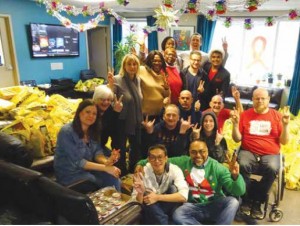
The staff and volunteers of the Ottawa AIDS Committee gathered together at Christmastime to prepare the many Holiday Hampers of food that they distribute to their clients. Photo Supplied
THE MAINSTREETER: Over the years since AIDS first came to the world’s attention, have there been any changes or developments in treatment that have helped those afflicted with the virus?
SALAM: Certainly the virus has evolved over the last three decades, and indeed there have been huge advancements made in the biomedical aspects of HIV, especially around HIV treatment and medication. There’s a lot of preventative tools that are there now, like PREP, for example, which is Pre-Exposure Prophylaxis. It’s a pill that people who are not living with HIV can take that reduces the risk of contracting HIV. And there is also a great deal of research being done to develop a vaccine for HIV that uses the same mRNA technology that underlies the COVID-19 vaccines.
There’s a lot to be excited about when it comes to the evolution of HIV. For instance, we now know that even if a person is living with HIV, if they are on medication and treatment and their viral load, as a result, becomes undetectable – meaning the level of virus in their blood is extremely low-then that person cannot sexually transmit the virus to another person.
So, there is much to be hopeful about for the future, but the piece that really still requires a lot of work is the stigma and discrimination that surrounds HIV. AIDS stigma was running rampant back in the early days of HIV, in the 1980s. And while things are different today in terms of the stigma, it still exists, and that’s probably our biggest battle when we do our work in the community. We are in a real fight today to eradicate HIV stigma and discrimination, even though we have all the information about HIV accessible to us, literally a fingertip away on our smartphones.
The reason why HIV stigma and discrimination still exists in 2021 is that it’s deeply rooted in larger issues like racism and homophobia, drug phobia and sexism, to name a few. There is still this mentality or these myths and misconceptions that black people brought HIV to Canada, or that gay folks deserve to have HIV because they’re doing something sinful, or that people who share needles that use drugs deserve to die, and that they’re at the bottom of our society, so who really cares. Those are just a few examples of how HIV stigma is connected to these larger issues. And because we haven’t been able to fully address those larger systemic issues, HIV/AIDS stigma and discrimination still exist and is still the same problem in our community that it was back in 2014.
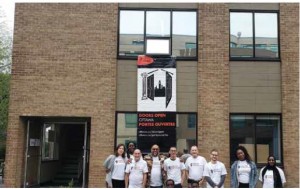
As a participant in the 2019 edition of Open Doors Ottawa, staff and volunteers gathered together to tour neighbours and others around their building and provide information about the important work they do. Photo Supplied
THE MAINSTREETER: How has COVID, in your opinion, affected the community of individuals in Ottawa and across Canada who have AIDS, in what way and to what extent?
SALAM: Not many people realize that COVID-19 and HIV are eerily similar in terms of the HIV epidemic back in the 1980s and the COVID-19 pandemic right now. For people living with HIV who were around in the early 80s, and who are still around today, COVID is a big trigger for them, and the commonality of the two epidemics has had a huge negative impact on the HIV community in terms of social isolation. And in particular, it’s been very harmful to people who may have already been isolated prior to the COVID pandemic because of HIV stigma and discrimination.
For example, many individuals who were shunned by their friends or their family or by society in general when they acquired HIV, now find that COVID has been another layer of harmful isolation. For a year and a half, these individuals haven’t been able to go outside to see anybody or to access services at a social service agency that might have helped them prior to COVID.
The pandemic has had a tremendous negative impact on people’s mental health no matter where you live in Canada, and especially for people living with HIV who were previously struggling with housing or food security issues. A lot of social services and resources that were previously available to people at risk of HIV or people living with HIV, including people who are severely immunocompromised, were redirected to COVID.
THE MAINSTREETER: Was there anything about the community that led you to recently renew your lease rather than relocate away from Old Ottawa East?
SALAM: The community response from Old Ottawa East has been amazing. We have incredible neighbours; people are very friendly, extremely supportive and helpful; they drop off food supplies for us or clothing to give out, or they come by and help out with our garden. I really feel that that we are part of this community now, and that was definitely a factor in us wanting to stay here. Had our staff and clients felt that we’re not wanted here, then for sure we would have looked elsewhere. But since the early days, you could feel that we were accepted, and you could see on the faces of folks who walk by our agency or walk into our agency that we are part of this neighbourhood.
THE MAINSTREETER: Any final thoughts, Khaled?
SALAM: If any of your readers are looking to lend a helping hand to a community-based organization, please consider ours. If you’re looking to be involved with a social justice organization or you want to fulfill a social activism need, then please volunteer with us. You can help in so many ways – you can make a monetary donation to ACO, or you can choose to come on board and volunteer here, which is an extremely rewarding experience. We are always happy to provide educational sessions for the community. If you’d like to know more about HIV, we can do an online one-on-one information session for you. Please feel free to drop by our offices any time. It’s been a very interesting discussion and a great pleasure.
